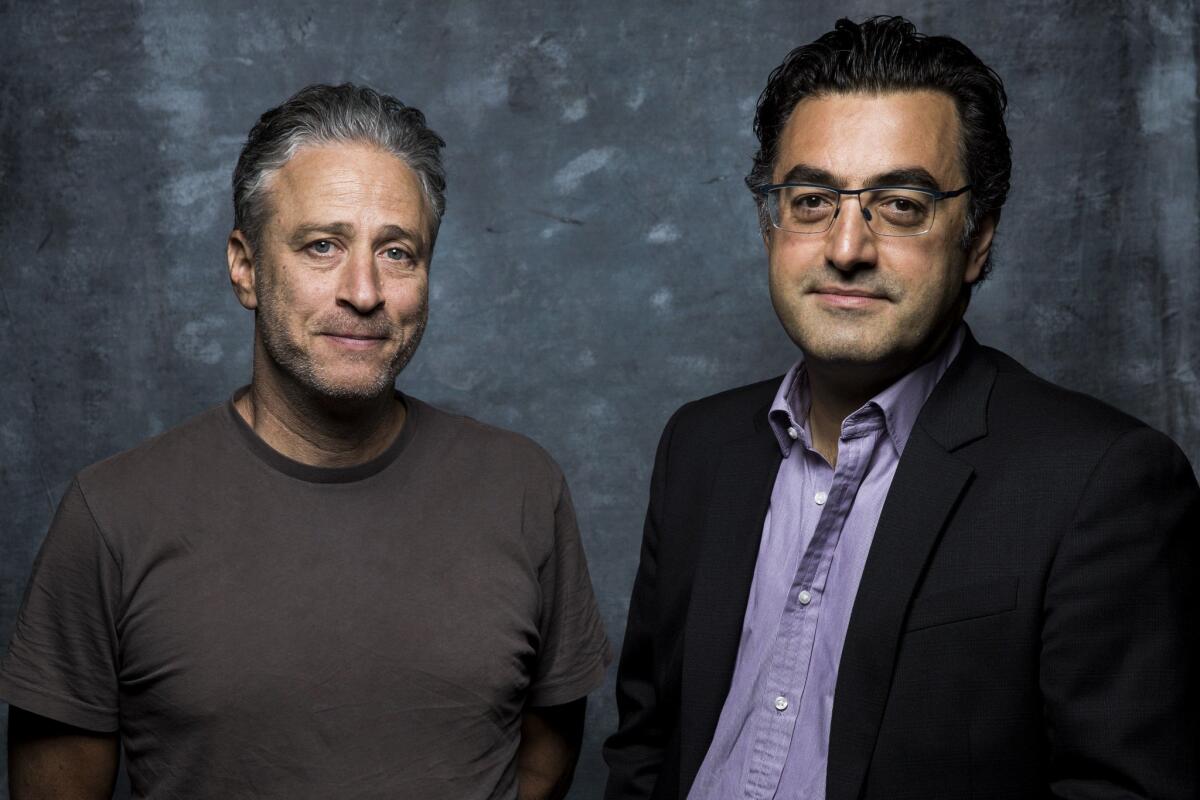The serious ‘Rosewater’ started out as a lark

It was easy for Maziar Bahari and Jon Stewart to laugh now.
They were sharing a table in the shade of oak trees at the annual film festival here, where their movie, “Rosewater,” had just screened to five sellout audiences over Labor Day weekend. An adaptation of Bahari’s 2011 memoir of his imprisonment, “Then They Came for Me,” “Rosewater” marks Stewart’s feature directing and screenwriting debut.
Improbably for a political drama about an imprisoned Iranian journalist, “Rosewater,” which opens in Los Angeles on Nov. 14 and stars Mexican actor Gael García Bernal as Bahari, delivered some of the festival’s lightest moments, particularly for its portrayal of a prison guard with a prurient interrogating style.
But the origin of the “Rosewater” story was anything but funny.
The two had first met more than five years ago. Bahari was an amiable Newsweek journalist covering the Iranian election when he was interviewed for a segment of Stewart’s “Daily Show.” He served as a straight man for foreign correspondent Jason Jones, answering deliberately inane questions such as “Why is your country so terrifying?” with sincere analysis about the depth of misunderstanding between the U.S. and Iran.
Four days later, guards arrested Bahari at his mother’s home in Tehran and took him to a prison, where interrogators tortured him, claiming Bahari was spying for a bizarrely broad group of co-conspirators — the CIA, Mossad, MI6 and Newsweek. Their proof: “The Daily Show.”
“Without any evidence, they had to come up with something,” Bahari said. “My guess is that some idiot came up with this piece of ‘The Daily Show’ —”
” — Or a fan,” said Stewart, who had been listening to Bahari describe the events that brought them together. “Coulda been a fan. Coulda been somebody who loved the show.”
It turns out that Bahari and Stewart were drawn together by more than the strange and frightening events of that summer in 2009. They also share some crucial qualities — a willingness to shout that the emperor has no clothes, an indefatigable work ethic and an appreciation for a good New Jersey joke.
The movie they made together for a budget of $10 million reflects those shared values, in particular a sense of the absurdity of authoritarianism. It begins with Bahari on a routine reporting assignment, reluctantly leaving his pregnant wife in London to cover the Iranian election.
The title comes from the nickname Bahari had given a buffoonish interrogator who wore strong, rose water-scented cologne. Played by Danish actor Kim Bodnia, Rosewater constantly presses Bahari for lurid details of his life in the West: Had he gotten “special massages”? Who was this man he had liked on Facebook, Anton Chekhov? And why had he visited New Jersey?
Shohreh Aghdashloo plays Bahari’s beleaguered mother and Claire Foy his steadfast wife, Paola, an Italian-English lawyer who lobbied for his release from London. The film cuts between the women’s experiences and Bahari’s in his cell.
Throughout his confinement, Bahari finds humor and solace in surprising places; in one particularly moving scene, Bernal dances cathartically in his prison cell to a Leonard Cohen song in his head.
‘Similar voices’
Stewart and Bahari are obviously comfortable with each other — Stewart claims Bahari did “The Daily Show” only to get his AFTRA card; Bahari claims Stewart threw tantrums on the Jordanian set when he couldn’t get bagels. Stewart is deferential to Bahari, dismissing questions about the career risk he took in directing by comparing it to the risk Bahari took as a journalist.
“I’ve had shows with my name on it canceled and the doors locked,” Stewart said. “And the next day I still get to go to the diner and order eggs and write jokes. So it’s knowing what real risk is versus what professional chances are.”
“Jon and Maziar have unbelievably similar voices as writers,” said producer Gigi Pritzker, who backed the film through her production company, Odd Lot Entertainment. “This became a very close relationship. You could see how important they were to each other.”
Bahari, 47, was born in Tehran, with a family history of political dissidence — his father was imprisoned under the shah’s rule and his sister under Ayatollah Khomeini’s. Growing up in revolutionary Iran, he said, he used humor as a defense against sadistic authority figures.
At age 21, Bahari moved to Montreal to study film and political science; after graduating, he worked as a journalist and documentarian, taking on a broad array of topics, from a film about Jewish refugees turned away by the U.S. in 1939 to a movie about Iranians’ love of soccer.
Stewart, 51, was born in New York to an educated, middle-class family, and he grew up in Lawrenceville, N.J., where, he has said, bullies taunted him for being Jewish.
“Both Jews and Iranians have one thing in common — that they have survived their tortuous history through humor,” Bahari said.
Stewart played soccer and studied psychology at the College of William and Mary in Virginia before embarking on a stand-up comedy career that would ultimately lead to hosting his satirical news show, starting in 1999. By the 2008 presidential election, Stewart’s cachet as an alternative news source was such that the New York Times asked in a headline, “Is Jon Stewart the Most Trusted Man in America?”
In 2009, Jones’ “Daily Show” trip to Iran was a bold and unusual move for the Comedy Central program; when Bahari was arrested, Stewart suddenly found himself in the unfamiliar terrain of a traditional news outlet with endangered sources.
“I don’t know if you know this, but we don’t actually go to these places,” Stewart said. “We have a green screen. We stand in front of it. So even on a peripheral level, the idea that something we had done could cause that type of damage was horrifying.”
While Bahari was imprisoned, his wife spearheaded an international campaign on his behalf; after 118 days and $300,000 in bail was posted, Bahari was released.
It was after Bahari appeared on Stewart’s show to promote a Newsweek cover about his ordeal that the idea for a film first took root, with Stewart aboard initially only as a producer. When discussions with potential screenwriters lagged, the two decided to proceed on their own.
“I do think the movie industry functions at a slightly different rhythm, and our impatience with that is what caused it to go in a different direction,” Stewart said. “It was born of a feeling that, if we keep going at this pace, a story that we feel is so relevant won’t be told for a very long time.”
Jordan film shoot
Stewart took a hiatus from “The Daily Show” in summer 2013 while they shot the film in Amman, Jordan, in blistering heat and with the Syrian civil war unfolding 45 minutes away. Stewart was re-creating a Shia Muslim country in a Sunni Muslim country, which posed challenges — no mosque, for instance, was open to the production, and other cultural sensitivities influenced the production design.
“There was some concern that a 50-foot sign of the Ayatollah Khomeini in the middle of a street during Ramadan in a Sunni country right after Arab Spring would have created a bit of a ruckus,” Stewart said. “So we created some green screen magic on a windy overpass. Those were the types of considerations we tried to be respectful of.”
Many in the Jordanian crew were fasting for Ramadan. Stewart apologized for the difficult working conditions, and he strategically deployed Arabic curse words he had learned. He had one helpfully ingratiating shtick where he kept re-introducing himself to crew members in Arabic in an overly formal fashion.
Bahari was often on the set as an advisor, even for the interrogation scenes; only the sequences involving his sister were too difficult for him to watch, he said.
“With the interrogation scenes, it’s almost like an out-of-body experience, like I’m watching myself on a closed-circuit TV,” Bahari said. “And maybe there’s something inside as well that is happy that I’m getting back at them. I really enjoyed thinking that my interrogator would one day see these scenes.”
Bahari has been traveling to promote the film, after Telluride visiting Toronto, London, San Francisco, Chicago, Miami and Austin, Texas.
On Nov. 13, in an event arranged by distributor Open Road Films that will be broadcast in 300 theaters nationwide, Stewart will participate in a live Q&A with his Comedy Central colleague Stephen Colbert.
After the film’s release, both Bahari and Stewart will continue with their day jobs — Bahari maintaining multiple websites for journalists and making movies of his own, including a documentary about Iran’s Baha’i community, “To Light a Candle,” due next year.
Stewart will keep hosting his show, and he hasn’t expressed a desire to make another film any time soon.
His primary takeaway from the project seems to be his friendship with Bahari.
“It’s very hard to define without verklempting,” Stewart said of the relationship. “When he first saw the film, and I knew at some level that I didn’t mess it up, that was the best feeling.”
Twitter: @ThatRebecca
More to Read
Only good movies
Get the Indie Focus newsletter, Mark Olsen's weekly guide to the world of cinema.
You may occasionally receive promotional content from the Los Angeles Times.







